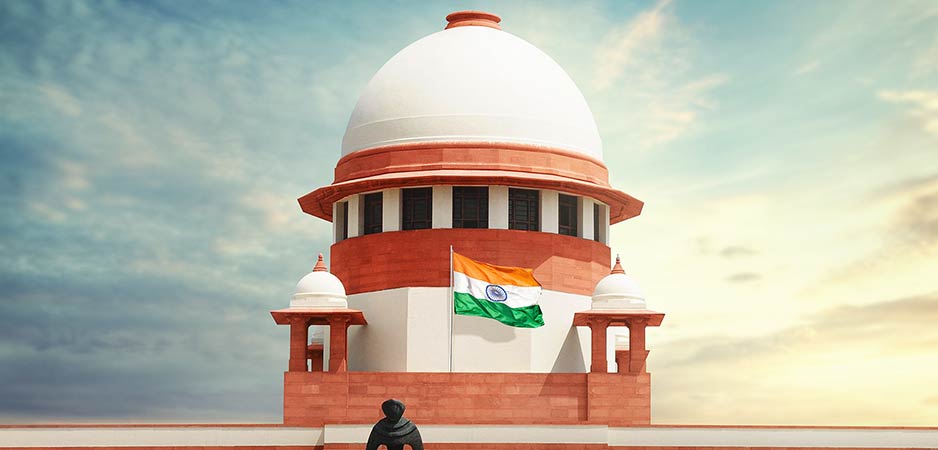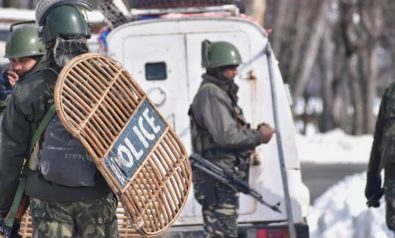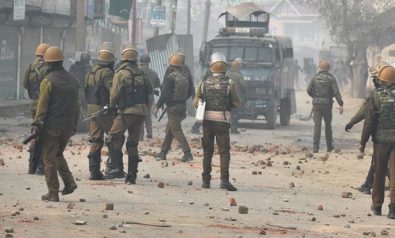In India, the ruling Bhartiya Janata Party has abrogated the special status for Jammu and Kashmir through a presidential order. Though the decision has been hailed nationwide as a step toward full integration of the state with the rest of India, it has been challenged in the Supreme Court for alleged violations of the constitution and other legal principles.
Why Article 370 Was Introduced
In the late 1940s, when the Indian Constitution was being framed, there was uncertainty about the status of Jammu and Kashmir due to a war with Pakistan. As a result, a temporary provision was enacted in the constitution in the form of Article 370. This provided special arrangements of power-sharing between the Indian central government and the state of Jammu and Kashmir. Through this provision, legislative privileges were extended to the state through increased autonomy. In doing so, the central government was barred from framing any laws for Jammu and Kashmir without the agreement of the state government.
Scroll down to read more on this 360° series
As the state of was given the right to draft and enact its own constitution, Article 370 was supposed to operate until the constituent assembly of Jammu and Kashmir took a final decision over the region’s accession to India. Accordingly, the choice over whether to retain or terminate Article 370 was with the constituent assembly, which never took place. Consequently, the provision continues to be part of the Indian Constitution to this day.
This viewpoint was endorsed by the Supreme Court in Prem Nath Kaul v. State of Jammu and Kashmir in 1959 when the court described the nature of Article 370 while deciding upon the legislative competence of Karan Singh, the son of Hari Singh who was the maharaja (local ruler) of Kashmir. Therefore, unlike the opinion of some observers, the temporary role of Article 370 was never related to the special status for Jammu and Kashmir, but merely its form and manifestation.
Among other things, Article 370 (1) (d) also empowered the president to apply through an order any part of the Indian Constitution, with or without modifications, to the state of Jammu and Kashmir. In line with the overall spirit of Article 370, the agreement or consultation of the state government was mandated for such orders to be passed.
It is this power that has been exercised by President Ram Nath Kovind through his order dated August 5, 2019, to apply the entire constitution to Jammu and Kashmir. The order has effectively revoked the special status that was guaranteed to the state by Article 370, even without amending the constitution and formally scrapping Article 370. The order also mentions that the move has been made in agreement with the state governor, Satya Pal Malik. Since Article 370 maintains that the state government actually means the state governor acting on the advice of the council of ministers, the order appears to hold firm.
Despite this, there are many violations of the Indian Constitution in letter and spirit. While an agreement with the governor of Jammu and Kashmir in absence of the state government is questionable, effectuating an amendment to the constitution by exercising an executive power is equally unconvincing. Furthermore, as mentioned earlier, the special status of Jammu and Kashmir is anything but temporary.
Legally Valid?
Since the presidential order has been made with the approval of the state’s governor and not the government, the fundamental question that needs to be addressed is whether Malik is permitted to act for the purpose of Article 370 (1) (d). One might be tempted to rely on the text of Article 370, which purports that the governor is legally allowed to give authorization under the article. This is further illustrated by the Supreme Court’s ruling in Mohd. Maqbool Damnoo v. State of Jammu and Kashmir of 1972 (Maqbool), but a closer perusal of the issue distinguishes the present scenario on two counts.
First, the text to Article 370 does not help the current presidential order because the governor alone has no authority to provide authorization and must act in consultation with the council of ministers for the state legislative assembly. Given that the state is currently under president’s rule, the council of ministers stands dissolved and the governor, therefore, cannot give his permission for the purpose of Article 370.
Second, the presidential order in Maqbool was only clarificatory in nature. The constitutions of India and Jammu and Kashmir, in their original form, had designated a position named sadar-i-riyaasat as the state government of Jammu and Kashmir. Things changed when the constitution for that state, through its sixth amendment, replaced this position with that of the governor. Thereafter, to make things consistent, a presidential order was made in agreement with the governor under Article 370 (1) (d). Deciding on the legality of this order, the Supreme Court had ruled that it was valid in light of the amendment to the constitution of Jammu and Kashmir.
This is strikingly different from the current presidential order where no involvement whatsoever of the state legislature exists. Since the state is currently under president’s rule, it seems as if Kovind had sought his own approval for passing the order.
Amending the Indian Constitution Indirectly
The doctrine of colorable legislation is an indisputable principle of Indian legal jurisprudence, which the courts have time and again applied whenever the legislature has attempted to commit an illegal act indirectly. Simply put, the doctrine establishes that one cannot do indirectly what cannot be done directly. By applying the entire Indian Constitution to the state of Jammu and Kashmir, the presidential order has made Article 370 inoperative. It has therefore used an executive power in such a way that it has, in effect, led to a constitutional amendment. Such changes can only be made by the legislature, while the president’s action of attempting a back-door amendment through an executive order is unlikely to pass the judicial scrutiny.
Interestingly, the order has replaced the phrase “Constituent Assembly of the state” under Article 370 (3) with “Legislative Assembly of the state.” Article 370 (3) authorizes the president to declare the provision inoperative if the constituent assembly recommends. The objective of bringing about this replacement seems clear: Since the constituent assembly of Jammu and Kashmir no longer exists, a formal revocation of Article 370 would have been impossible in its present form.
With this interpretative change, the process of formally scrapping Article 370 will be eased out and the ruling government would only need a majority in the legislature of the newly-formed union territory of Jammu and Kashmir to sail it through. With talk of an attempt to change the demographics of the region already doing rounds, gaining such a majority does not appear to be difficult. The only hurdle, however, is the same principle of colorable legislation as discussed earlier. The president has attempted to tamper with the sanctity of a constitutional procedure. If this objective is proved before the court, the chances of the presidential order’s survival are bleak.
The said replacement also violates two landmark decisions on the subject. The Supreme Court, while deciding the applicability of the central financial laws in Jammu and Kashmir in the State Bank of India v. Santosh Gupta of 2016, has ruled that a revocation of Article 370 is possible only with the recommendation of the constituent assembly of the state. Given its absence, the provision seems to have assumed permanence. Additionally, the court observed in Sampat Prakash v. State of Jammu and Kashmir of 1968 that the constituent assembly of Jammu and Kashmir had desired that Article 370 shall continue to operate with one modification.
Analyzing the Order Through a Moral Lens
Morally, the sophistry indulged in by the government is even more indefensible because the entire process involved no opinion from the state and its people. The governor, being an appointee of the central government, cannot be considered to represent the interests of the people of Jammu and Kashmir by any stretch of imagination.
It has more in common with colonial days when the powers that used to rule through their representatives did not consider the inhabitants of being worth any consultation. The Indian Constitution, prepared through a democratic exercise, has been used in a democratic country to trump democracy itself. What is worse is that the whole exercise was carried out by creating an atmosphere of terror, suspending civil liberties and stifling people’s voices, bringing back the cruel memories of British colonial rule. Brute force — on the ground and in Parliament — has been used to thrust the presidential order and the law for the reorganization of the state upon the people of Jammu and Kashmir. It still remains to be seen whether the people will accept it without offering any resistance.
While the political narrative that surrounds the presidential order to scrap Article 370 comprises mostly hysteria that the authors seek not to indulge in, it is no exaggeration to say that there are plenty of legal hurdles that the government must jump over. The ball is likely to enter the judicial court soon. The question is whether the Indian judiciary will cling onto the spirit of constitutionalism or uphold the presidential order.
The views expressed in this article are the author’s own and do not necessarily reflect Fair Observer’s editorial policy.
Support Fair Observer
We rely on your support for our independence, diversity and quality.
For more than 10 years, Fair Observer has been free, fair and independent. No billionaire owns us, no advertisers control us. We are a reader-supported nonprofit. Unlike many other publications, we keep our content free for readers regardless of where they live or whether they can afford to pay. We have no paywalls and no ads.
In the post-truth era of fake news, echo chambers and filter bubbles, we publish a plurality of perspectives from around the world. Anyone can publish with us, but everyone goes through a rigorous editorial process. So, you get fact-checked, well-reasoned content instead of noise.
We publish 2,500+ voices from 90+ countries. We also conduct education and training programs
on subjects ranging from digital media and journalism to writing and critical thinking. This
doesn’t come cheap. Servers, editors, trainers and web developers cost
money.
Please consider supporting us on a regular basis as a recurring donor or a
sustaining member.
Will you support FO’s journalism?
We rely on your support for our independence, diversity and quality.










